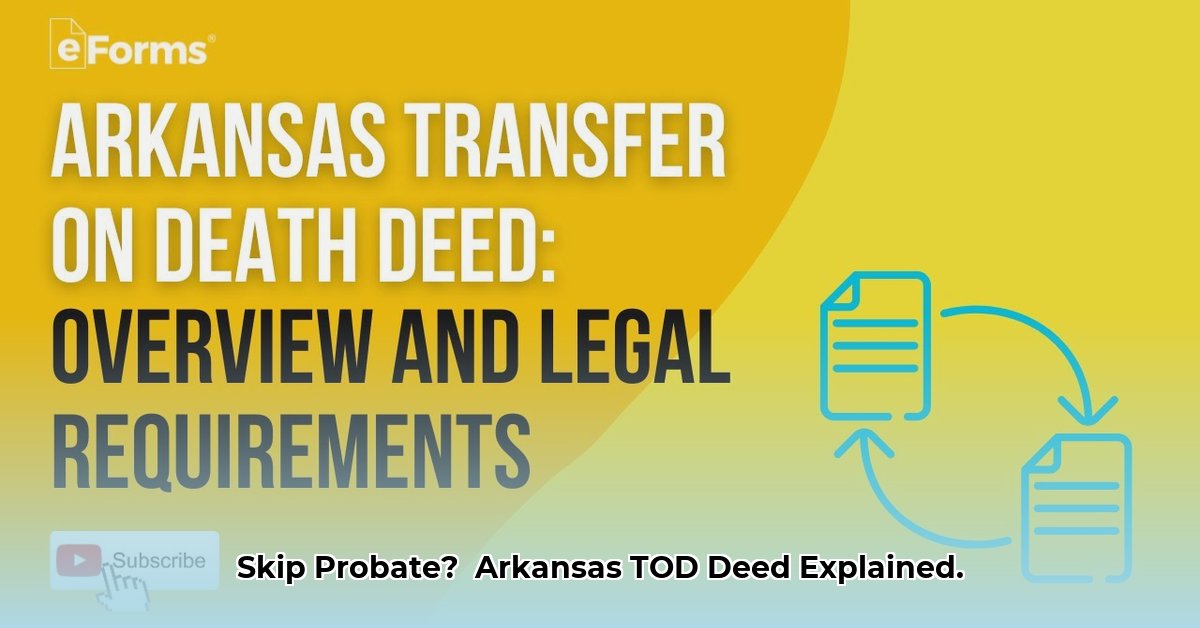
Want to simplify your estate plan and make things easier for your loved ones? An Arkansas Transfer on Death (TOD) deed, also known as a beneficiary deed, might be the answer. This legal document allows you to transfer your property directly to your chosen beneficiaries upon your death, bypassing the often-lengthy and costly probate process. This guide explains how to avoid probate in Arkansas using a TOD deed.
Who Should Consider a TOD Deed?
If you own property in Arkansas and want a straightforward way to transfer it to your loved ones after you die, a TOD deed is worth considering. It's especially beneficial if you want to avoid the expenses and delays of probate court. Are you ready to reduce the burden on your heirs during a difficult time?
The Advantages of an Arkansas TOD Deed
A TOD deed offers several key advantages over traditional property transfer methods:
- Avoid Probate: This is the biggest benefit. Probate can be slow, costly, and complex. A TOD deed completely bypasses this process.
- Save Money: Probate fees can significantly reduce your estate's value. A TOD deed avoids these costs, potentially saving your family thousands.
- Save Time: Probate can take months or even years. A TOD deed ensures immediate transfer of your property, offering your heirs significant time savings.
- Simplicity: The process is relatively straightforward compared to probate, though seeking legal advice is always recommended.
Creating and Recording Your Arkansas TOD Deed: A Step-by-Step Guide
Creating and recording a TOD deed involves several crucial steps:
Gather Necessary Information: You'll need the precise legal description of your property (not just the address!), your beneficiary's full legal name and address, and any other information required by Arkansas law. Accuracy is crucial for a valid deed.
Drafting the Deed: While you can use a template, it's strongly recommended to hire an attorney. This ensures compliance with Arkansas Code Section 18-12 and minimizes the risk of errors that could invalidate the deed.
Completing the Deed Form: Carefully fill out the form, ensuring all information is accurate and complete. Any inaccuracies could lead to delays or rejection. Pay close attention to the required language mandated by Arkansas law.
Witnessing and Notarization: Arkansas law requires your signature to be witnessed and notarized. This step verifies your signature's authenticity and adds the legal weight required for a valid deed.
Recording the Deed: File the completed deed with the county recorder's office in the county where your property is located. You'll need to pay a recording fee – check with your county clerk for the current amount. This final step officially registers the transfer.
Potential Challenges and Considerations
While TOD deeds offer many advantages, potential issues exist:
- Multiple Deeds: If you create multiple TOD deeds for the same property, only the most recently recorded one is valid.
- Changing Beneficiaries: Changing or canceling a TOD deed requires following specific legal procedures. It’s not as simple as changing a will. Seek legal guidance.
- Revocation: You can revoke a TOD deed, but legal advice is vital to ensure you follow proper procedures and avoid invalidating the deed.
When to Seek Legal Advice
Even though the basic concept is straightforward, legal advice is always recommended, especially in these situations:
- Complex property ownership.
- Multiple properties or beneficiaries.
- Specific conditions or limitations on the property transfer.
- Any uncertainty about the process.
A lawyer can ensure your TOD deed complies with Arkansas law and meets your specific needs.
Risk Assessment for Arkansas TOD Deeds
While TOD deeds streamline property transfer, understanding potential risks is crucial:
| Risk Category | Likelihood | Severity | Mitigation |
|---|---|---|---|
| Improperly Executed Deed | Moderate | High | Use a qualified attorney. |
| Failure to Record | Moderate | High | Record the deed immediately after signing. |
| Legal Challenges | Low | Medium | Have a lawyer review the deed before execution. |
| Changes in Arkansas Law | Low | Medium | Stay informed about changes in Arkansas property law. |
Remember, a TOD deed simplifies the transfer of your Arkansas property, saving time and money for your loved ones. By understanding the process and seeking legal advice when necessary, you can ensure a smooth and efficient transfer of your assets. Don’t postpone this important aspect of estate planning.